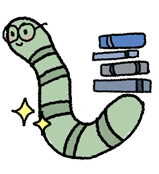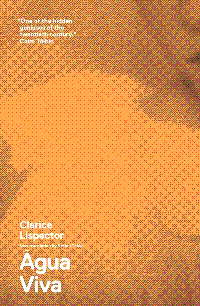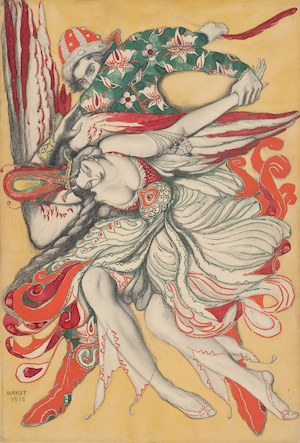 |
Água VivaPlanted: September 22, 2025
|
This is my review of Água Viva (1973) by Clarice Lispector, the September 2025 pick for the online book club, Bookbug. You can see my other Bookbug Club reviews here and all of my other book reviews here.

Bookbug members! If you would like to discuss Água Viva with me, you can connect with me by leaving a message in my guestbook!

by Clarice Lispector
How does one even begin to describe Água Viva? There are no characters. There is no plot. It is not quite poetry, not quite prose. It is, as straightforwardly written on page 16, improvisation: "I'm improvising. But what's wrong with that? improvising as in jazz they improvise music, jazz in fury, improvising in front of the crowd." Like jazz, Água Viva must be read with the heart, and experienced by sitting down and reading it cover to cover. No review or video or blog post can do it justice. Just like how it is impossible to hear an improvised saxophone solo without actually experiencing it firsthand.
Água Viva is a stream of consciousness. Through it, I grappled with the meanings of life, death, and how experience living. Which are massive and inexplicable. The title, Água Viva—meaning jellyfish in Brazilian Portuguese and literally translating to English as "Living Waters"—is appropriate because it is from the waters that life began. And the ocean, like the vast expanse of outer space, strike the same sort of existential fear and dread.
"My small and ever so limited head bursts when thinking about something that doesn't begin and doesn't end—for that is the eternal." (p.19)
Despite touching on origins and ends, an overarching theme of the book is the "instant-now."
The instant-now. Which comes and goes constantly and infinitely. How can you capture the instant-now?
Seriously though, Água Viva transports us through a montage of instant-nows: contemplations of primordial soups in dark carvern puddles, geraniums growing in a São Paulo windowsill, mirrors, horses... An overwhelming barrage of vignettes to paint the invisible and illogical:
"Could it be that what I am writing to you is beyond thought? Reasoning is what it is not. Whoever can stop reasoning—which is terribly difficult—let them come along with me." (p.26)
I suspect that Água Viva is not a one-and-done book. Its meaning—which is never direct but is suggested between the lines—probably morphs with each subsequent read.
Here are some random moments in Água Viva that struck a chord with me:
1. The Firebird

While exploring the concept of birth, death, and rebirth, I thought about the phoenix—one of my favorite myths—and lo and behold on page 53 she mentions one of my favorite pieces of art of all time, Igor Stravinsky's 1919 ballet, L'Oiseau de feu: "I think I'm going to die. But I can't it's too late. I heard 'The Firebird'—and drowned entirely." Girl, same (I have performed the orchestral suite in college but have only seen the full ballet online via YouTube. I actually have "See The Firebird" as a bucket list item). The story involves a phoenix's death and rebirth, yes, but the overall experience of the ballet is otherwordly and devastatingly beautiful.
2. Animalizing the Self
As you may know, I am a painter, and I primarily paint animals.
Sometimes I simply paint an animal in simple observation, but for my "major" works I arrange animals and flowers in an attempt to portray my (very human) experiences. Why animals? Why not fellow humans, or even a self-portrait? I could never quite put into words why I would much rather paint animals than humans (or my own face), until I read this passage:
"Sometimes I get electrified when I see animals. I'm now hearing the ancestral cry within me: I no longer seem to know who is the creature, the animal or me. And I get all confused. It seems I get scared of facing up to stifled instincts that I'm forced to acknowledge the presence of the animal.
"I knew a 'she' who humanized animals talking to them and giving them her own characteristics. I don't humanize animals because it's an offense—you must respect their nature—I am the she who animalizes myself. It's not hard and comes simply. It's just a matter of not fighting and it's just surrendering." (p.42)
Wow, yeah. Dang, Clarice. I'm having a moment right now.
3. Love and Roses
Água Viva's story of a rose on pages 44-45 (abbreviated here to save on space)...
"...Every two days I would buy a rose and place it in water in a vase made specially narrow to hold the long stem of a single flower. Every two days the rose would wilt and I would exchange it for another. Until one certain rose.
"...An intimate relationship intensely developed between me and the flower: I admired her and she seemd to feel admired.
"...Then she died. It was with reluctance that I replaced her. And I never forgot her.
"...something had gone on between me and the rose. That rose—made me want to call it 'jewel of my life,' because I often given things names—had so much instinct by nature that I and she had been able to live each other profoundly, as only can happen between beast and man." (Água Viva, pp.44-45)
...reminded me of how the little prince learns about how love transforms us:
The little prince went away, to look again at the roses.
"You are not at all like my rose," he said. "As yet you are nothing. No one has tamed you, and you have tamed no one. You are like my fox when I first knew him. He was only a fox like a hundred thousand other foxes. But I have made him my friend, and now he is unique in all the world."
And the roses were very much embarassed.
"You are beautiful, but you are empty," he went on. "One could not die for you. To be sure, an ordinary passerby would think that my rose looked just like you—the rose that belongs to me. But in herself alone she is more important than all the hundreds of you other roses: because it is she that I have watered; because it is she that I have put under the glass globe; because it is she that I have sheltered behind the screen; because it is for her that I have killed the caterpillars (except the two or three that we saved to become butterflies); because it is she that I have listened to, when she grumbled, or boasted, or even sometimes when she said nothing. Because she is MY rose. (The Little Prince, pp.86-87)



